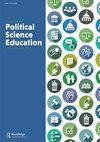直接宣传课程中的反种族主义教学法
IF 0.6
Q3 POLITICAL SCIENCE
引用次数: 0
摘要
尽管需求巨大,但对于那些寻求将反种族主义教学法融入其课程和课程的政治科学教师来说,可用的资源太少了。迄今为止,由于我们的学科与我们所研究的政治行为者和制度之间的关系,没有出版物关注以反种族主义方式教授政治学课程时必须考虑的特殊因素。在本文中,我将讨论反种族主义教学法的一些基本原则,并考虑如何在涉及直接倡导的政治学课程中实施这些原则。在胡克斯、坎达斯瓦米和岸本之后,我认为反种族主义教学要求教师对自己的位置进行批判性反思——既作为种族资本主义社会中的个人,也作为某一学科中特定部门的教员。此外,课程设计过程必须考虑谁的观点是课程设计过程的中心,以及学生的情感需求如何反映在我们的教学实践中。最后,当涉及到反种族主义教学法时,我们教的方式和教的内容一样重要,甚至更重要。本文章由计算机程序翻译,如有差异,请以英文原文为准。
Antiracist Pedagogy in Direct Advocacy Courses
Abstract Even though the need is great, there are too few resources available to political science faculty who seek to integrate antiracist pedagogy into their courses and curriculum. To date, there are no publications that focus on the special considerations that must be taken into account when teaching political science courses in an antiracist way due to the relationship between our discipline and the political actors and institutions we study. In this article, I discuss some of the foundational principles in antiracist pedagogy and consider how they can be implemented in political science courses that involve direct advocacy. Following hooks, Kandaswamy, and Kishimoto, I argue that that antiracist teaching requires instructors to engage in critical reflection on their own positionality—both as individuals in a society structured by racial capitalism, and as faculty members in particular departments, within an academic discipline. Further, that the course design process must take into consideration whose perspectives are being centered in the course design process and how students’ emotional needs are reflected in our teaching practices. Finally, that when it comes to antiracist pedagogy how we teach is as much or more important than what we teach.
求助全文
通过发布文献求助,成功后即可免费获取论文全文。
去求助
来源期刊

Journal of Political Science Education
POLITICAL SCIENCE-
CiteScore
1.80
自引率
36.40%
发文量
69
期刊介绍:
The Journal of Political Science Education is an intellectually rigorous, path-breaking, agenda-setting journal that publishes the highest quality scholarship on teaching and pedagogical issues in political science. The journal aims to represent the full range of questions, issues and approaches regarding political science education, including teaching-related issues, methods and techniques, learning/teaching activities and devices, educational assessment in political science, graduate education, and curriculum development. In particular, the journal''s Editors welcome studies that reflect the scholarship of teaching and learning, or works that would be informative and/or of practical use to the readers of the Journal of Political Science Education , and address topics in an empirical way, making use of the techniques that political scientists use in their own substantive research.
 求助内容:
求助内容: 应助结果提醒方式:
应助结果提醒方式:


